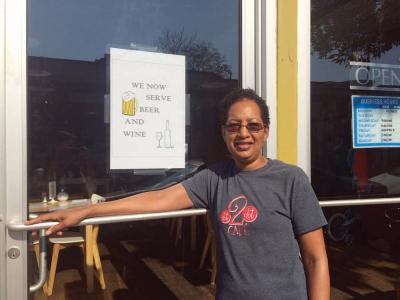July 30, 2015
 Karen Henry-Garrett secured a new liquor license for her Dot 2 Dot Café earlier this year. Lauren Dezenski photo
Karen Henry-Garrett secured a new liquor license for her Dot 2 Dot Café earlier this year. Lauren Dezenski photo
Nearly a year after neighborhood-specific liquor licenses were created in the city of Boston, local restaurants say they are still working to take full advantage of what the licenses have to offer their businesses, including expanded hours and additional jobs.
“We haven’t used ours to its full potential yet,” said Karen Henry-Garrett, co-owner of Dot 2 Dot Cafe on Dorchester Avenue near St. Mark’s church. “Managing to actually snag one of these, and being a small business, you’re not necessarily prepared for the way that you’re going to have to change your business model.”
Over the next three years, 75 new liquor licenses will come on line in the city, with 60 of them in under-served neighborhoods such as Dorchester, Mattapan, and Roxbury.
Businesses were eligible to apply for the first round of 25 licenses last September and to date, only seven of them have been awarded in Dorchester, including Dot 2 Dot, Pho Le in Fields Corner, and Sweet Life in Lower Mills.
“We’re encouraged by what we’ve seen come online in the first year,” At Large City Councillor Ayanna Pressley told the Reporter on Tuesday, although she admits more could be done by the city to expedite the licensing process, including appointing a “restaurant czar” at City Hall to help grease the wheels for busy small businesses to successfully obtain licenses. “One of the challenges is despite a great deal of momentum and visibility on this issue, many do not know that this law is in effect and that we have eliminated this cost-prohibitive barrier,” said Pressley.
Dot 2 Dot Café was the restaurant that Pressley had in mind while working to craft the legislation and it was one of the first recipients of the new liquor license. Henry-Garrett said she had sought a liquor license for her business, which mainly serves breakfast and lunch fare, for the last five years. “It definitely adds a few hundred dollars to the daily takings,” said Henry-Garrett, a Le Cordon Bleu-trained chef. “The difference isn’t huge, but the potential is certainly there. Now it’s my time to push that potential. The restriction is not having the staff to back it up.” She has held off on rapidly transforming her restaurant, instead adding mimosas and Bloody Marys to her brunch service and serving beer and wine at evening events hosted in the restaurant space.
“You automatically assume you’ll do dinners because it makes sense,” Henry-Garrett said. “But I haven’t had the capacity to make that happen. I can’t do 15 hours on my own in the kitchen every day.”
She hopes at some point o add dinner service to the cafe’s line-up. In the meantime, she is focusing on catered dinner events crafted around specifically planned menus that allow people to book in advance, which lets her know if she has enough activity to turn a profit that night.
“If we know our numbers, we can run this. If we can get 30 bums on chairs, we’re set.”
Henry-Garrett also called the process of acquiring the license “not easy, but absolutely worth it.” She credits the help of former St. Mark’s Area Main Streets coordinator Meaghan Overton, Pressley, the pro-bono work of liquor license lawyer Dennis Quilty, and the help of community members such as Former State Rep. Mel King for their advocacy.
Sweet Life co-owner Kristen Ahern also hopes to add dinner service to her bustling Lower Mills cafe and bakery. Ahern learned just last week that her application for a full liquor license was successful. But like Henry-Garrett, she too is easing in to the change.
“I’m definitely taking a cautious approach to this,” Ahern said in an interview with the Reporter on Tuesday. “We’ll start with beer and wine on weekends to see what the process is like for us internally. Then roll it out later on, once I have it figured out.”
That internal process goes beyond just stocking up on bottles.
“We have to change a lot,” said Ahern. “Not in the layout of the restaurant, but we have to change the whole area behind the bar to accommodate the liquor, do something downstairs to store it, stock it initially, and make other changes in order to facilitate the preparing and serving of alcohol.
“Alcohol brings a whole other level of worries.”
To acquire the license, before going to the city’s licensing board, Ahern had to visit the local civic association and merchants group for their OK. She said their concerns were primarily around serving alcohol first thing in the morning, how late the restaurant would be open, and ensuring the restaurant did not create a bar specifically to serve alcohol. The association signed off and the ball continued rolling.
Ahern said the license is “invaluable” to her business.
The annually renewed, neighborhood-specific license costs roughly $3,000 compared to hundreds of thousands of dollars for a regular full liquor license–a sum a local neighborhood eatery simply cannot swing compared to a heavyweight restaurant downtown. As a result, “We can keep the costs where we need to be” and ultimately do not pass them on to customers, she said.
She plans to begin serving fare like brunch cocktails before the end of the summer and is eyeing sometime later in the fall to start serving dinner.
“In this industry, it is so difficult because our margins are so small. It’s mind-boggling how much this costs. In order for small businesses to stick around and not charge an arm and a leg, we need to have value-added benefits like this [liquor license],” Ahern said. “And it’s nice too to walk in, have a drink, have a dinner, not have to park your car, and not have to pay for parking.”



